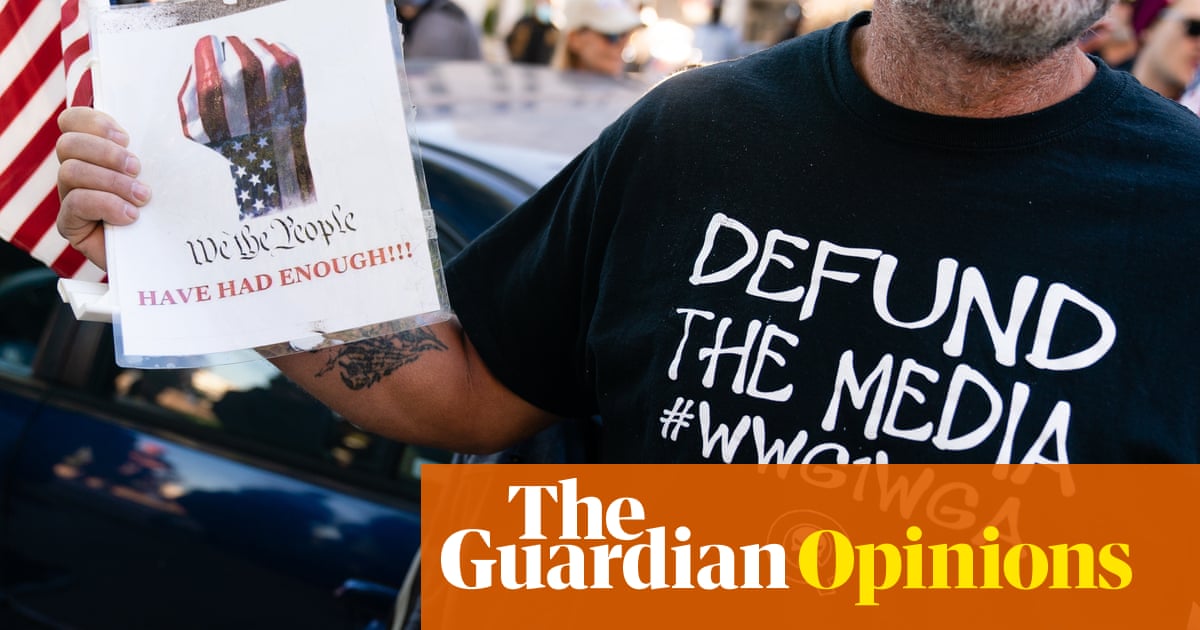QAnon and the ‘Trump coup’ have more in common than you might think

I have a friend who’s the stepmother to a young boy and this boy’s birth mother has gotten deeply into QAnon. How deep? She recently told him that the world is flat, and anyone who tells him otherwise is a paedophile. She is determined to take him out of school in order to shield him from cannibals, satanists and Democrats. Every time my friend updates me on the project of raising a child in joint custody with this person, I experience a kind of vertigo. How would you even do it?
Now imagine that, instead of raising a child, you and this person had to set emissions standards and develop a sustainable healthcare system. This is not far from the condition of US democracy in 2020: two centre-right corporate parties, one socially progressive and the other socially reactionary; a left divided between the internet and the academy; and an indeterminate number of maniacs.
The maniacs are QAnon. It’s complicated, but QAnon is essentially an online conspiracy theory based on interpreting the gnomic posts of an unidentified person (or group of people) known as Q, who purports to be a high-ranking official in the US government. Q’s message to the faithful is that this government is secretly controlled by a cabal of satanic paedophiles whom Donald Trump will one day round up and execute, in a mass cleansing called the Storm.
This Storm is not going to happen, of course. If it ever does, I will freely admit that I was wrong from whatever gibbet I am on while Facebook groups remake society – but it will also never be cancelled, because anticipating this Storm is what makes QAnon a compelling fantasy. It’s impossible to know how many people actually believe in QAnon as an accurate description of how the world works, relative to how many just enjoy talking about it as a kind of online game. For both groups, though, the appeal is world building. Q is a collaborative work of speculative fiction that replaces this world with one that it both more exciting and more legible. The essence of that world is the Storm: the fantasy that those who disagree with your politics are not just wrong but evil, in a way that justifies finally smashing them.
In this central fantasy, QAnon resembles another form of fantasy politics from 2020 – one that gained traction not among the desperate underclass of disenfranchised internet addicts, but among the broad professional centre of US politics. I am referring to the speculation that President Trump would refuse to leave office if he lost the election.
People seem to have politely forgotten this theory, but in September and October, it was trafficked by several of the most respectable news and commentary outlets in the US. The Washington Post published an article by the co-founder of the Transition Integrity Project that gamed out scenarios in which “players”, including former Republican National Committee chair Michael Steele and Hillary Clinton campaign chairman John Podesta, took on the roles of factions determined to install their candidate by any means necessary. In October, the New Yorker published a piece headlined “What can you do if Trump stages a coup?” These grandes dames of political analysis were joined by less impressive imitators in what became, during the months before the election, a micro-genre of news speculation.
The coup scenario has not come to pass, unless you count the series of unsuccessful lawsuits Trump’s campaign has filed in an attempt to overturn various state election results – which I do not. The president’s motives remain inscrutable, but if you are going to risk it all on a bid to overthrow US democracy, you do not put Rudolph Giuliani in charge.
The Trump coup theory attracted a more sophisticated audience than QAnon, and from an epistemological standpoint it was far stronger. I would never say the two scenarios were similar in their premises or their reasoning. But they had one thing in common: they were both animated by the fantasy of being done with democracy. The Storm and the Trump coup both imagined worlds in which their audiences would have to stop trying to win over their political opponents.
If we understand fantasy not as worlds we want to come to pass but rather worlds that offer outlets for feelings we have to repress in this one, the popularity of QAnon and the Trump coup scenarios makes sense. They are symptomatic of a democracy that has become frustrated with democratic means. Like QAnon, a Trump putsch held out the possibility of a righteous cleansing of Republican extremists that would reduce the hard problems of representative governance to the comparatively simple logistics of civil war. Civil war is bad, obviously, but it rewards the winners with one-party rule. Both QAnon and the Trump coup were dark fantasies that came with the same happy ending: a situation in which decent Americans no longer had to argue with the ignorant and evil, because we were finally justified in simply overpowering them. That we cannot do so under ordinary conditions is what makes US democracy such a pain in the ass.
At this point, the possibility of a coup seems consigned to the realm of past fantasy, fading as we move on from the zeitgeist that made it compelling. I don’t know what will happen to QAnon once Trump leaves office. Probably, my friend’s stepson’s mother will keep coming up with reasons why the various antagonists in her life are evil. The hard work of democracy will return to bringing people like her back in. It would probably be easier to round them up. A lot of things would be easier, if more of us were monsters.
*** This article has been archived for your research. The original version from The Guardian can be found here ***


